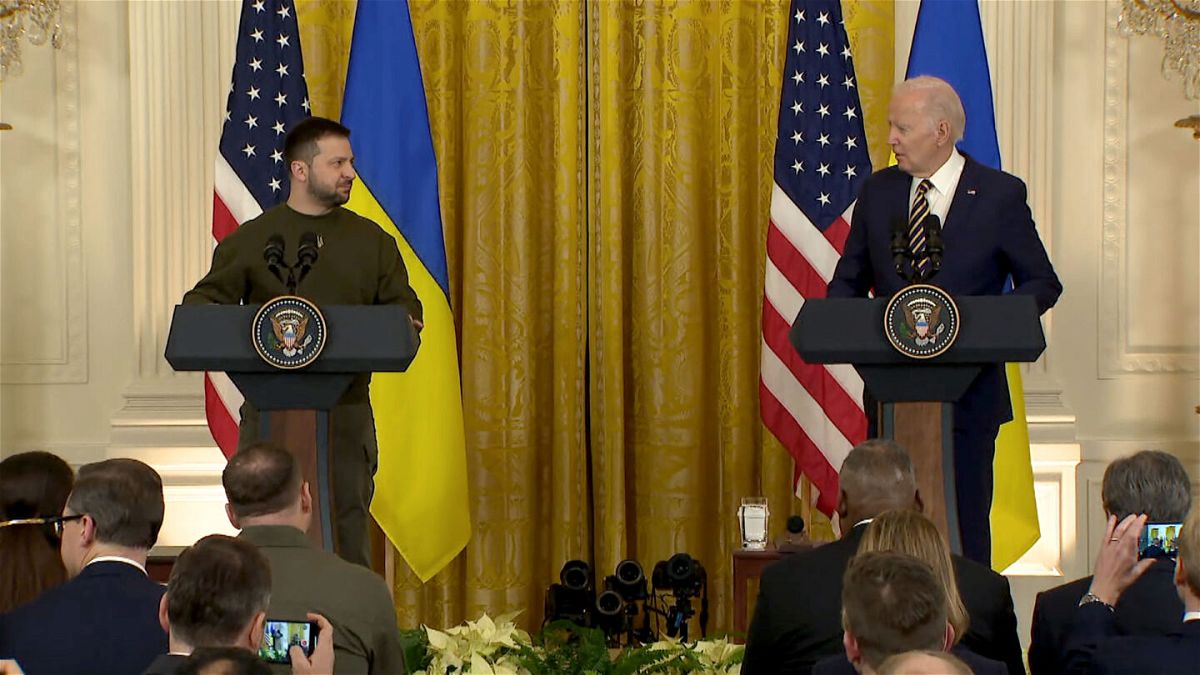Biden designates area sacred to tribes as largest national monument of his presidency

President Joe Biden delivers remarks at Ulster University in Belfast
By Ella Nilsen and Kevin Liptak, CNN
President Joe Biden on Tuesday officially designated a new national monument in Southern Nevada while speaking at a conservation event at the Interior Department.
At more than 506,000 acres, the Avi Kwa Ame National Monument is one of the largest tracts of land to come under federal protection so far during Biden’s presidency, preserving Nevada’s Spirit Mountain and the desert around it.
“It’s a place of reverence, a place of spirituality, a place of healing,” Biden said Tuesday. “It will now be recognized for the significance it holds and be preserved forever.”
Biden’s proclamation is a major victory for the surrounding Fort Mojave Indian Tribe, which has been advocating for the monument’s creation for around three decades.
“Avi Kwa Ame is the point of Mojave creation; it’s a very important and integral part of our history and belief system,” Ashley Hemmers, the tribal administrator for Fort Mojave, told CNN. “For us, that mountain is a living landscape; it’s like a person. If something were to happen to it, it would be like losing a loved one.”
During an emotional speech Tuesday, Interior Secretary Deb Haaland highlighted Interior’s work to honor and uplift tribal nations and their knowledge of the land.
“We’re incorporating Indigenous knowledge and honoring tribes for their role in stewarding our lands and waters since time immemorial,” Haaland said, tearing up during her speech.
“I was thinking about how the federal government tried to erase Indigenous people in so many ways; taking their lands, taking their children, taking their lives and taking away bison that were so central to many tribal nations,” she added, talking about a recent order she signed to restore American bison. “The bison are still here here, and Indigenous people are still here.”
Biden also designated the Castner Range National Monument in Fort Bliss in West Texas, which was a training site for the Army during World War II, the Korean War and the Vietnam War.
“It’s a place of incredible beauty,” Biden said of Castner Range, describing the Mexican poppies that grow there as “transforming desert hills into a sea of yellows and oranges.”
Together, the two monuments will protect close to 514,000 acres of new public lands. In addition, Biden is directing Secretary of Commerce Gina Raimondo to consider protecting all US waters around the Pacific Remote Islands as part of a new national marine sanctuary.
Biden made the announcement at a summit for tribal leaders and elected officials that was hosted by the White House and Interior Department.
As they met, climate and youth activists demonstrated outside the Interior Department’s headquarters to protest the recently approved Willow oil drilling project in Alaska. The Biden administration approved the controversial Willow Project last week. The drilling project, which is slated for the National Petroleum Reserve in Alaska, galvanized a surge of online activism against it in recent months. Environmental advocates have filed two lawsuits in federal court to stop the project.
Inside the department, the focus was on protecting the new national monuments and the area around Spirit Mountain, which Biden initially vowed to designate as a national monument in November at the White House tribal nations summit.
“When it comes to Spirit Mountain and the surrounding canyons and regions in southern Nevada, I’m committed to protecting this sacred place that is essential to the creation story of so many tribes that are here today,” Biden said in his November speech, adding, “And I look forward to being able to visit Spirit Mountain and experience it with you as soon as I can.”
Spirit Mountain — known as Avi Kwa Ame in Mojave language — sits in the Mojave and Sonoran Deserts in Southern Nevada. It is a sacred site for more than 10 tribal nations and is the site of tribal ceremonies and rituals.
Designating the new monument has rankled some clean energy groups who warn it could hamper wind and solar energy development in Southern Nevada.
While Interior and the Bureau of Land Management have identified millions of acres in Nevada for renewable energy development, much of the public land within the proposed monument area can’t be considered for clean energy development because they are part of the critical habitat for a desert tortoise species, the Department of Interior said last year.
There is a pending application for a solar project on about 2,575 acres that the department has identified as exempt from conservation, an Interior spokesperson said last year.
Outside of the monument area, the Bureau of Land Management has identified more than 9 million acres of federal land that could be used to build utility-scale solar panels, as well as 16.8 million acres of federal land that could be developed for wind energy.
Hemmers said that while the tribe wants to actively encourage recreation on the newly created national monument, it wants to see energy and clean energy development done elsewhere in Nevada.
“They can both protect an area while also walking towards an energy future that gets us to our climate goals,” Hemmers said.
Hemmers, who watched Biden declare his intention to designate Avi Kwa Ame a national monument in November along with her elderly grandmother — a survivor of the brutal, federal Native American boarding school program — said seeing the proclamation finalized would bring an immense sense of “relief.”
“It would give me a sense of relief that people in my community cannot have that burden on their shoulders, being threatened by possibly losing a piece of us,” she told CNN.
The-CNN-Wire
™ & © 2023 Cable News Network, Inc., a Warner Bros. Discovery Company. All rights reserved.